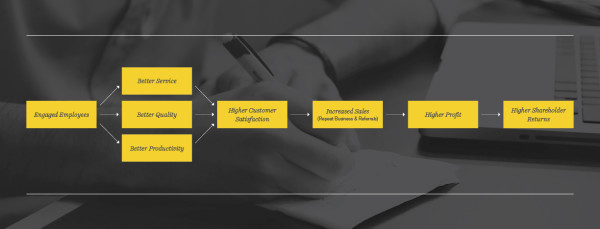
Have you ever wondered what’s really important in maintaining a long-lasting, meaningful relationship? Ever wondered what that one thing is that keeps two people connected more than almost anything else? I recently told my wife how beautiful she was repeatedly over the span of a weekend. It didn’t register with her and I didn’t get the response I expected. She seemed a little frustrated and when I asked what the problem was she told me that complimenting her looks made her feel uncomfortable and doesn’t acknowledge her value as a partner in our relationship. It was a great reminder that showing her I genuinely appreciate and care about who she is and what she does is key to showing I understand her.
Genuine and heartfelt appreciation is necessary in both personal and professional relationships.
Regardless of the inherent benefits we gain from our marriage or our job, there’s nothing more rewarding than feeling that we contribute value and are recognized for it. Recognizing what you appreciate about people is a basic principle that applies to how managers treat their team members, how husbands and wives interact and how brands treat their customers.
Everyone wants to feel appreciated because there’s almost nothing better than knowing you truly matter. For many, appreciation is a simple thank you. However, when you’re in a relationship “thank you” is only the beginning. Genuine appreciation that impacts the other person must go beyond the obvious. It has to recognize the specific accomplishment or contribution, and then it must communicate respect and show an understanding of what the person contributed.
Imagine applying the power of appreciation to your workplace. Think about how people would feel about themselves and the company if they knew that what they did was noticed and appreciated? Would collaboration, cooperation and creativity increase? Would engagement and loyalty improve? No doubt.
Appreciation fuels positive energy
Research year-on-year shows that less than 45% of employees are fully engaged and 26% are actively disengaged in their work. Are you kidding me? Sit down and get real with your engagement scores because you’ve likely got a challenge to solve and a significant opportunity to unlock. Team members who believe their managers are genuinely interested in their wellbeing and feel valued are more likely to thrive and grow, and as a result positively contribute to the success of the company. When people don’t feel appreciated, they tune out and don’t contribute their best.
Appreciation increases performance
Appreciation and recognition increases engagement and engagement improves performance and value for everyone involved. Kevin Kruse (@Kruse) describes the ripple effect that employee engagement has on an organization as The Engagement Profit Chain and it flows from Engaged Employees leading to… better service, quality, and productivity, which leads to… higher customer satisfaction, which leads to… increased sales (repeat business and referrals), which leads to… higher levels of profit, which leads to… higher shareholder returns.

Appreciation needs specifics
Make it a priority to notice what others are doing right and practice being sincere about the specifics. Showing genuine appreciation is about communicating how you feel. Tell the other person what benefit their efforts bring to the organization or to your relationship. Be specific about what you appreciate. Don’t just say, “You’re awesome” say, “I appreciate how you looked at all sides of the data and you didn’t give in until you solved that challenge.” Recognize that extra effort applied to a project or performance in tough circumstances. “I know we had a tight deadline to meet, and I really appreciate you staying late last night to get the presentation out to Fedex.” Appreciate the day-to-day too. Notice when people do things consistently right and thank them for it.
Appreciation requires meaningful actions
The power of a handwritten card remains one of the most personal representations of appreciation and recognition that you can send. Evoking deeper meaning than the ostensible ‘thank you’. However, there is no limit of great examples, tools and tactics that have been designed to show others how much they are appreciated and recognized. Technology-inspired examples include wearable technology like the Thankz App which through Bluetooth allows people to send thanks to a wearable badge. And Bonusly a software award system that allows employees to send instant micro-bonuses to their co-workers. At Bulldog Drummond, we often pass on a little gratitude in the form of suds, sending our favorite brew as a token of gratitude.
I recently received a poem from an entrepreneur partner that expressed gratitude in an uncommon way; it is a note I’ll never forget.
Appreciating others doesn’t come naturally
Expressing our appreciation at work is often awkward and doesn’t always come naturally. It’s not a skill that is taught. Recognizing others for their contribution, and being able to genuinely communicate and acknowledge what we see, is a skill that needs to be emphasized with anyone in management. A great place to start is making sure you appreciate you. Take a few moments at the end of the day to ask yourself, “What did I accomplish today that I can feel really good about? And what can I improve on tomorrow?” Constant self-improvement and self-appreciation will put you in the right mindset to appreciate those around you.
Appreciating consumers doesn’t happen enough
By now I hope you’re motivated and inspired to pay more attention, and to show your spouse, your team members and those you work with specific and genuine appreciation for the value they add and the impact they have on others. When I look at the number of loyalty programs that exist and the lack of value and good they deliver, I believe there’s a whole new area of business ready to build when it comes to showing customers and guests genuine appreciation for their loyalty.
On a parting note, I know that your time is valuable so I’d be remiss to not thank you for taking time out of your day to read this article. I hope it nudges you to act, sparks an idea or acts as a reminder of the basics of appreciation. Cheers to you.
Business & Finance Articles on Business 2 Community(74)






